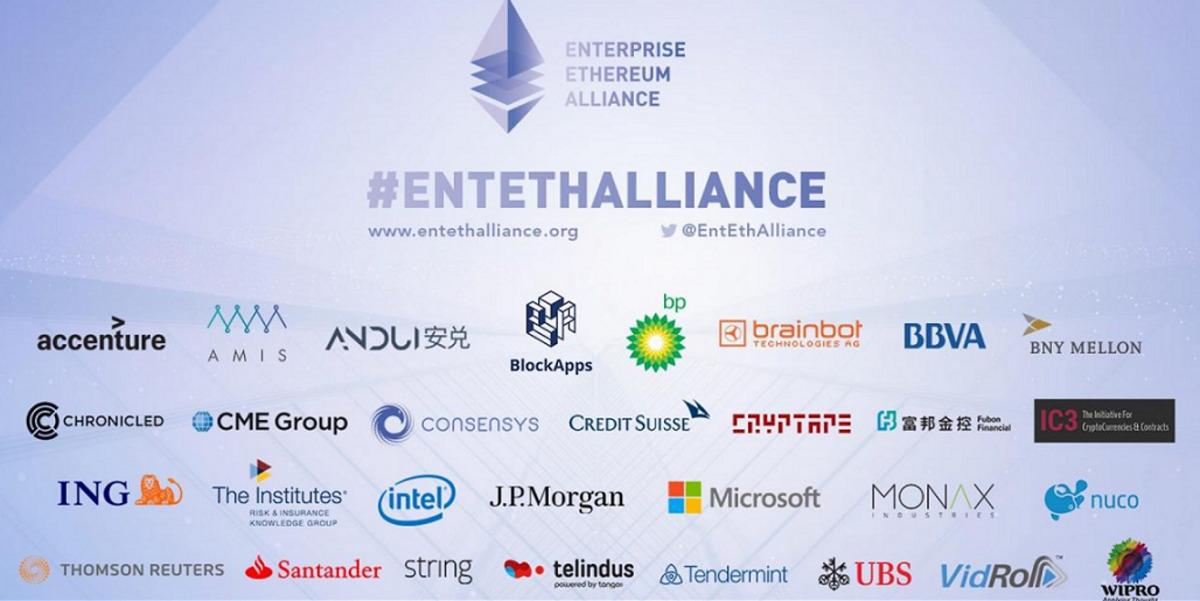Introduction
Welcome to the world of Ethereum, a decentralized open-source blockchain platform that has revolutionized the way businesses operate. Since its inception in 2015, Ethereum has gained widespread adoption across various sectors, allowing companies to harness its capabilities for innovative use cases. In this article, we will explore some of the notable companies that have embraced Ethereum and are leveraging its potential to drive their operations forward.
Ethereum, often referred to as the “world computer,” offers a robust and flexible infrastructure for building and deploying decentralized applications (DApps). With its native cryptocurrency, Ether (ETH), Ethereum enables smart contracts, giving businesses the ability to automate and execute transactions without intermediaries. This groundbreaking technology has sparked tremendous interest and has attracted a myriad of companies across different industries.
From the finance sector to healthcare, supply chain management to gaming, Ethereum has found applications in diverse fields. These companies have recognized the advantages of utilizing Ethereum, including enhanced security, transparency, and cost savings. By leveraging Ethereum, businesses can streamline their operations, gain a competitive edge, and tap into the potential of blockchain technology.
In the following sections, we will delve into various sectors and explore the companies that have embraced Ethereum for their unique business requirements. From financial giants to startups, all these companies have recognized the potential of Ethereum and its ability to transform their industries.
Companies in the Finance Sector
The finance sector has been quick to adopt Ethereum due to its ability to revolutionize traditional financial systems. One prominent example is JPMorgan Chase, a global investment banking leader. JPMorgan Chase has developed its own blockchain platform, Quorum, which is built on top of Ethereum. Quorum enables secure and efficient settlement of transactions and has been used for various applications, including interbank payments and supply chain finance.
Another notable player in the finance sector utilizing Ethereum is Mastercard. As a leading global payment technology company, Mastercard has been exploring ways to leverage blockchain technology. In partnership with ConsenSys, they have developed several blockchain-based payment solutions powered by Ethereum. These solutions aim to enhance security, speed up transaction processing, and provide traceability for cross-border payments.
In addition, Ripple, a blockchain company specializing in cross-border payments, has integrated Ethereum blockchain into its RippleNet network. This integration allows financial institutions to access Ethereum’s smart contracts and decentralized applications while leveraging Ripple’s fast and low-cost payment solutions. By merging the strengths of Ethereum and Ripple, companies can achieve greater interoperability and scalability in their financial transactions.
Furthermore, decentralized finance (DeFi) has become a major use case for Ethereum in the finance sector. Companies like MakerDAO and Compound leverage Ethereum’s smart contracts to offer decentralized lending and borrowing platforms. These platforms enable users to access loans and earn interest on deposited assets without intermediaries, providing greater financial inclusivity and transparency.
Overall, the finance sector has recognized the potential of Ethereum to transform traditional financial systems. From global banking giants to innovative startups, companies are leveraging Ethereum’s capabilities to enhance security, speed up transactions, and explore new avenues such as DeFi. As blockchain technology continues to evolve, it is expected that more companies in the finance sector will embrace Ethereum and its myriad of applications.
Companies in the Technology Sector
The technology sector has embraced Ethereum for its ability to drive innovation and disruption across various domains. One of the most prominent companies in this sector actively utilizing Ethereum is Microsoft. Microsoft has integrated Ethereum into its Azure cloud platform, allowing developers to easily deploy and manage Ethereum-based applications. This integration has opened up new possibilities for businesses to build decentralized applications on a trusted and scalable infrastructure.
Another notable player in the technology sector harnessing the power of Ethereum is IBM. IBM has developed its blockchain platform, IBM Blockchain, which supports Ethereum as one of its core technologies. This platform enables organizations to build and deploy blockchain applications using smart contracts and facilitates secure and transparent transactions. IBM has been actively working with clients from different industries, including supply chain, finance, and healthcare, to leverage Ethereum and drive digital transformation.
Additionally, ConsenSys, a leading blockchain software company, has played a crucial role in the development and adoption of Ethereum. ConsenSys offers a wide range of tools, frameworks, and solutions to help enterprises and developers build and implement Ethereum-based applications. Their expertise and contributions have been instrumental in advancing the Ethereum ecosystem and driving its adoption in the technology sector.
Moreover, Brave Software, the creator of the privacy-focused web browser Brave, has integrated Ethereum blockchain into its platform. The browser rewards users with Basic Attention Tokens (BAT) for viewing privacy-respecting advertisements. The integration of Ethereum enables seamless and secure transactions of BAT tokens and fosters a more efficient and transparent advertising ecosystem for both users and advertisers.
The technology sector has recognized the potential of Ethereum to transform various industries and drive innovation. Through partnerships, integrations, and the development of Ethereum-based solutions, companies like Microsoft, IBM, ConsenSys, and Brave Software are leading the way in exploring and implementing blockchain technology for a more decentralized and connected future.
Companies in the Supply Chain Management Sector
The supply chain management sector has seen significant benefits from Ethereum’s technology, particularly in improving transparency, efficiency, and traceability. One notable company in this sector that has implemented Ethereum is Maersk, the world’s largest shipping company. Maersk utilizes Ethereum blockchain to track and verify the movement of shipping containers across its vast global network. This ensures greater transparency, reduces paperwork, and minimizes the risk of fraudulent activities.
Another example of Ethereum’s application in supply chain management is Everledger. Everledger is a technology company that leverages blockchain, including Ethereum, to track and verify the authenticity and provenance of valuable assets such as diamonds, fine wines, and luxury goods. Ethereum’s smart contracts enable immutable records that can be accessed and verified by various parties, ensuring the integrity of the supply chain.
In addition, Provenance, a London-based blockchain startup, uses Ethereum to bring transparency to supply chains in industries such as food and fashion. By recording every step of the supply chain on the Ethereum blockchain, Provenance enables consumers to trace the origin of products, ensuring ethical and sustainable practices.
Furthermore, Ambrosus, a blockchain company specializing in supply chain management, has integrated Ethereum into its platform. Ambrosus offers solutions that enable real-time monitoring of goods during transportation and storage, ensuring the quality and integrity of products. By leveraging Ethereum smart contracts, Ambrosus creates an immutable record of each transaction, providing certainty and trust to supply chain participants.
Overall, Ethereum has the potential to transform the supply chain management sector by improving transparency, traceability, and efficiency. Companies like Maersk, Everledger, Provenance, and Ambrosus have embraced Ethereum’s capabilities to revolutionize supply chain processes and build trust among stakeholders.
Companies in the Energy Sector
The energy sector has begun to recognize the potential of Ethereum and blockchain technology in revolutionizing energy management and distribution. One company leading the way in this sector is WePower, a blockchain-based green energy trading platform. WePower connects renewable energy producers with consumers and uses Ethereum smart contracts to enable transparent and secure energy transactions. This decentralized approach allows consumers to purchase green energy directly from producers, promoting sustainability and reducing dependence on traditional energy sources.
Another influential player in the energy sector embracing Ethereum is Siemens. Siemens is exploring various applications of blockchain technology, including using Ethereum for energy trading and grid management. By leveraging Ethereum’s smart contracts, Siemens aims to create a decentralized energy marketplace that allows secure and efficient trading of electricity and promotes renewable energy integration.
Additionally, LO3 Energy, a New York-based startup, utilizes Ethereum to build peer-to-peer energy markets. They have developed a platform called “TransActive Grid” which enables local energy sharing and trading among households and businesses. By using Ethereum smart contracts, LO3 Energy provides a transparent and reliable platform for energy transactions, reducing reliance on centralized energy grids and fostering a more sustainable and resilient energy ecosystem.
Furthermore, Power Ledger, an Australian company, leverages Ethereum to facilitate peer-to-peer energy trading and management. Power Ledger’s platform enables individuals and businesses to trade surplus solar energy directly with others, creating a decentralized marketplace for energy exchange. By utilizing Ethereum’s smart contracts, Power Ledger ensures secure and transparent transactions, empowering consumers to have greater control over their energy usage and promoting renewable energy adoption.
The energy sector is gradually realizing the potential of Ethereum to redefine energy distribution and management. Through innovative platforms and solutions offered by companies like WePower, Siemens, LO3 Energy, and Power Ledger, Ethereum is playing a pivotal role in promoting renewable energy and creating a more sustainable and decentralized energy landscape.
Companies in the Health Sector
The health sector has started to explore the applications of Ethereum and blockchain technology to address various challenges such as the security and privacy of patient data, interoperability of healthcare systems, and drug supply chain management. One notable company making strides in this sector is Philips, a global leader in health technology. Philips is actively involved in blockchain research and development, including the integration of Ethereum-based solutions. By leveraging Ethereum’s smart contracts, Philips aims to improve the security, authenticity, and accessibility of healthcare data, enabling better patient care and research collaboration.
Another prominent player in the health sector harnessing the power of Ethereum is Gem. Gem is a blockchain platform that provides secure and interoperable solutions for healthcare organizations. Their platform, built on Ethereum, facilitates efficient data exchange, consent management, and identity verification in healthcare systems. By leveraging Ethereum’s decentralized infrastructure, Gem ensures the integrity and privacy of patient data, enabling seamless data sharing among healthcare providers.
Furthermore, Medicalchain, a UK-based company, utilizes Ethereum blockchain to develop patient-centric electronic health records (EHRs). Medicalchain’s platform enables patients to take control of their health data and securely share it with healthcare providers. By integrating Ethereum smart contracts, Medicalchain ensures that patient records are immutable and accessible only to authorized parties, revolutionizing the way EHRs are managed and improving overall healthcare outcomes.
Moreover, Coral Health, a Canadian healthcare technology company, adopts Ethereum to build a secure and transparent platform for healthcare providers to access and share patient data. Through Ethereum’s blockchain, Coral Health offers a decentralized solution that allows patients to maintain control over their health records while enabling seamless and secure data exchange between healthcare organizations.
The health sector is witnessing the potential of Ethereum to improve data security, interoperability, and patient-centric healthcare. Companies like Philips, Gem, Medicalchain, and Coral Health are leveraging Ethereum’s capabilities to address the complex challenges faced by the healthcare industry, ultimately improving the quality and efficiency of patient care.
Companies in the Gaming and Entertainment Sector
The gaming and entertainment sector has embraced Ethereum for its potential to revolutionize the way games are developed, played, and monetized. One notable company in this sector leveraging Ethereum is Ubisoft, a leading video game publisher. Ubisoft has joined the Ethereum ecosystem through its partnership with Ultra, a blockchain-based gaming distribution platform. By integrating Ethereum’s blockchain technology, Ultra aims to provide a decentralized marketplace for gamers, offering opportunities for game developers to monetize their creations and players to own and trade in-game assets securely.
Another influential player in the gaming and entertainment sector utilizing Ethereum is Decentraland. Decentraland is a virtual reality platform built on top of Ethereum, allowing users to buy, sell, and trade virtual land and digital assets. By leveraging Ethereum’s blockchain, Decentraland enables true ownership and scarcity of virtual assets, revolutionizing the concept of virtual worlds and creating a vibrant ecosystem for creators and gamers.
Additionally, Enjin, a blockchain-based gaming platform, harnesses Ethereum to empower players with true ownership of in-game items. Through Ethereum’s smart contracts, Enjin facilitates secure and transparent transactions of digital assets, enabling players to buy, sell, and trade in-game items with confidence. This integration of Ethereum enhances the gaming experience by allowing players to truly own and monetize their virtual belongings.
Furthermore, Gods Unchained, a blockchain-based trading card game, utilizes Ethereum for secure ownership and trading of digital cards. By leveraging Ethereum’s blockchain, Gods Unchained ensures that players have complete ownership and control of their cards, with scarcity and authenticity guaranteed. This creates a vibrant secondary market where players can buy, sell, and trade their collectible cards without the need for intermediaries.
The gaming and entertainment sector is witnessing the transformative power of Ethereum in creating decentralized ecosystems, empowering players, and redefining the concept of ownership in virtual worlds. Companies like Ubisoft, Decentraland, Enjin, and Gods Unchained are at the forefront of driving this revolution, demonstrating the potential for Ethereum to reshape the gaming and entertainment industry as we know it.
Companies in the Real Estate Sector
The real estate sector has begun to explore the potential of Ethereum and blockchain technology to streamline processes, improve transparency, and enhance security in property transactions. Propy, a blockchain-based real estate marketplace, is one company leveraging Ethereum to facilitate secure and efficient property transactions. By utilizing Ethereum’s smart contracts, Propy enables the automated execution of property contracts, reducing the need for intermediaries and ensuring the integrity of transactions.
Another notable player in the real estate sector utilizing Ethereum is Ubitquity. Ubitquity offers a blockchain-based platform that enables transparent and secure recording of property ownership data. By leveraging Ethereum’s blockchain, Ubitquity ensures the immutability and traceability of property records, reducing the risk of fraudulent activities and providing greater trust and transparency in real estate transactions.
Furthermore, Atlant, a decentralized real estate platform, harnesses Ethereum to enable peer-to-peer ownership, rental, and transfer of real estate assets. With Ethereum’s smart contracts, Atlant ensures that property ownership rights are recorded and executed accurately, providing a transparent and efficient platform for real estate transactions.
Moreover, Harbor, a blockchain technology company, integrates Ethereum to tokenize real estate assets. Tokenization allows fractional ownership of real estate properties, enabling individuals to invest in property assets with smaller amounts of capital. Ethereum’s smart contracts facilitate the ownership transfer and distribution of tokenized real estate assets, providing liquidity and accessibility to a wider pool of investors.
The real estate sector is experiencing the benefits of Ethereum and blockchain technology in terms of improved transparency, efficiency, and liquidity. Propy, Ubitquity, Atlant, and Harbor are leading the way in exploring and implementing Ethereum-based solutions to enhance the real estate transaction process and redefine property ownership and investment opportunities.
Companies in the Agriculture Sector
The agriculture sector is recognizing the potential of Ethereum and blockchain technology to address various challenges such as traceability, supply chain management, and fair trade practices. One notable company in this sector leveraging Ethereum is GrainChain, a blockchain platform that enables transparent and efficient transactions in the agricultural supply chain. By utilizing Ethereum’s blockchain, GrainChain provides a secure and immutable record of transactions, ensuring transparency and trust among participants, from farmers to distributors and buyers.
Another influential player in the agriculture sector harnessing Ethereum is Provenance, a technology company focused on creating transparency in supply chains. Provenance utilizes Ethereum’s blockchain to track and verify the origin and quality of agricultural products. By leveraging smart contracts, Provenance ensures that information about product certifications, farming practices, and fair trade is accessible to consumers, promoting sustainable and ethical practices in the agriculture industry.
Additionally, AgriDigital, an Australian-based company, leverages Ethereum to transform the agriculture supply chain through digitization. AgriDigital’s platform utilizes Ethereum’s smart contracts to automate and streamline processes such as contract management, payment settlements, and inventory tracking. By eliminating paperwork and providing real-time visibility of transactions, AgriDigital enhances efficiency and transparency in agricultural transactions.
Furthermore, Ambrosus, a blockchain company specializing in supply chain management, has extended its application to the agriculture sector. Ambrosus utilizes Ethereum’s blockchain to track and verify the quality and authenticity of agricultural products. Through smart contracts, Ambrosus ensures that information regarding product origin, quality, and handling is recorded transparently, reducing fraud and promoting consumer trust.
The agriculture sector is gradually realizing the potential of Ethereum to enhance transparency, traceability, and efficiency in the supply chain. Companies like GrainChain, Provenance, AgriDigital, and Ambrosus are at the forefront of using Ethereum’s capabilities to drive positive change in the agriculture industry and create a more sustainable and equitable ecosystem for farmers, consumers, and other stakeholders.
Conclusion
Ethereum has emerged as a groundbreaking technology, revolutionizing various industries through its decentralized approach and smart contract functionality. This article explored the diverse range of companies that have embraced Ethereum across different sectors.
In the finance sector, companies like JPMorgan Chase, Mastercard, and Ripple have harnessed Ethereum’s capabilities to enhance payment systems, streamline transactions, and explore new avenues such as decentralized finance (DeFi).
The technology sector has embraced Ethereum for its ability to drive innovation, with Microsoft, IBM, ConsenSys, and Brave Software leading the way in integrating Ethereum into their platforms and solutions.
Companies in the supply chain management sector, such as Maersk, Everledger, Provenance, and Ambrosus, are leveraging Ethereum to enhance transparency, traceability, and efficiency in supply chain processes.
The energy sector is recognizing Ethereum’s potential to transform energy management and trading. Companies like WePower, Siemens, LO3 Energy, and Power Ledger are utilizing Ethereum to enable peer-to-peer energy trading, promote renewable energy adoption, and create decentralized energy marketplaces.
In the health sector, companies like Philips, Gem, Medicalchain, and Coral Health are utilizing Ethereum to improve data security, interoperability, and patient-centric healthcare solutions.
The gaming and entertainment sector has seen companies like Ubisoft, Decentraland, Enjin, and Gods Unchained leverage Ethereum to enhance game development, enable true ownership of in-game assets, and build decentralized gaming ecosystems.
In the real estate sector, companies like Propy, Ubitquity, Atlant, and Harbor are utilizing Ethereum to streamline property transactions, enhance transparency, and enable tokenization of real estate assets.
Lastly, in the agriculture sector, companies such as GrainChain, Provenance, AgriDigital, and Ambrosus are leveraging Ethereum to enhance transparency, traceability, and efficiency in agricultural supply chains.
Overall, the adoption of Ethereum across various industries reflects its potential to transform traditional systems, enhance transparency, improve security, and drive innovation. As Ethereum continues to evolve and mature, we can expect to see more companies across diverse sectors embrace this technology, unlocking new possibilities and reshaping industries for a more decentralized and connected future.

























